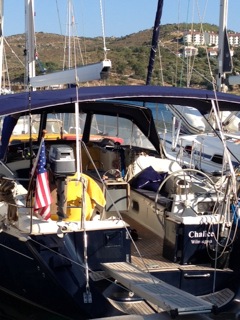At the crowded dock in Bodrum, Turkey, I was supposed to be looking for a 60' wooden gulet by the name of Alinda that was to take us and a few friends on a two-week cruise of southeastern Turkey.
Instead, my eyes kept being diverted to the number of yachts tied up to the pier that were flying the Stars and Stripes and sporting Delaware on their transoms.
Gee, I thought, this is exciting to see so many American boats that have made the long journey to Turkey.
Dah, dead wrong.
At closer inspection, there were no Americans aboard. Only Turks. And there were curious misspellings of Wilmington (like Willmington) and even of Delaware, like Deleware. Those were the signals that something was not as it seemed.
So I asked our Turkish captain, Osman, for an explanation and did a bit of research on the Internet — when I could get a connection. Osman says that flying the Old Glory facilitates access of Turkish boats into many ports both inside and out of Turkey.
But there's another, perhaps even more compelling reason: taxes.
It seems that the Turks have discovered what many Yanks already know — that it's cheap to register a boat in Delaware, as the state is known to be one of the most convenient and cheapest places on the market for yacht registration. Boat owners here know that by having a Delaware registered boat, a Turk can avoid paying local taxes, while Delaware gains by raking in more dollars for resource protection, boating education and safety patrols.
My Internet search revealed that paperwork for yacht registrations can be completed in two weeks or less, and according to the state of Delaware's website, it costs between $10 and $180 a year to register a boat, depending on size of the vessel and length of registration. Registered agents who can handle all the details freely advertise in foreign boating magazines and on the internet.
This has caught on big time here, as I saw an array of boats, from mega-yachts to small monohulls sporting the U.S. and Turkish flags on their masts. Such a strange sight, with no English-speaker in sight.
This apparently grates on the U.S. sailors who do make the long journey to Turkey. Several sailing blogs that I read complained about the practice, saying that it "dilutes a yachtie's pride and patriotism," and makes those who legitimately cross the Atlantic feel "ripped off" to arrive here and "be surrounded by phony U.S.-flagged vessels."
I hear that the boating stores in most harbors here are well-stocked with U.S. flags, as demand continues to be strong.




